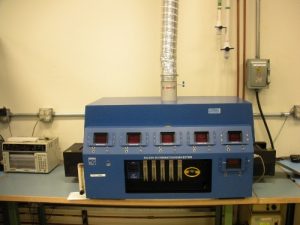Moisture Sensitivity Level Testing (MSL)
Moisture Sensitivity Level testing (MSL testing) identifies the classification level of non-hermetic solid state surface mount devices (SMDs) that are sensitive to moisture-induced stress. Moisture sensitivity level testing determines how to properly package, store and handle SMDs to avoid damage during reflow solder attachment.
It is essential to establish a package’s moisture sensitivity level prior to subjecting the part to the preconditioning sequence. This MSL level will dictate storage times for unsealed devices awaiting assembly. MSL testing is usually performed at two levels to determine the level of capability at the highest and lowest temperatures that the SMD is expected to see during its actual assembly.
IPC/JEDEC J-STD-020 is the standard approach in determining a package’s moisture sensitivity level. The reflow temperatures are dependent on package thickness, volume and whether Pb-free or SnPb solder is used.
Test Sequence
- Initial visual inspection
- 1st acoustical microscope
- Bake for 24 hours at 125°C
- Moisture Soak
- Reflow 3X
- Final visual inspection
- 2nd acoustical microscope
ORS performs MSL testing at the highest temperature that the SMD is expected to see during actual assembly.
Note
Due to the trend of switching to Pb-free solder, along with recent changes in JEDEC standards that apply to Moisture Sensitivity Level (MSL) and preconditioning testing, an explanation of the differences between MSL and pre-conditioning testing is warranted.
IPC/JEDEC J-STD-020D.1 is the standard used to initially identify the classification level of non-hermetic solid state surface mount devices (SMDs) that are sensitive to moisture-induced stress in order to properly package, store and handle to avoid damage during assembly solder reflow attachment.
JESD22-A113F is the test method that establishes an industry standard preconditioning sequence for non-hermetic SMDs that are subjected to multiple solder reflow operations. The SMDs should be subjected to the appropriate preconditioning sequence prior to being submitted to specific testing to evaluate the long term reliability.




